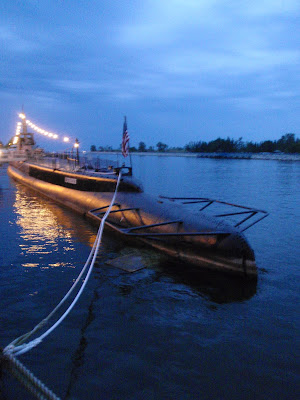 |
| From GLNMM_Muskegon 2 |
Our accommodations on Sunday night were aboard a 1927 US Coast Guard Cutter, USCGC McLane, that was commissioned by President Calvin Coolidge with the intention of interdicting the rum and whiskey-running bootleggers of the Prohibition Period. Evidently, the McLane was somewhat less successful in its mission than Silversides, undoubtedly due to the fact that the relatively slow cutter could not match the pace of the souped-up speedboats employed by the bootleggers. That night, our dreams of “The Untouchables” were accompanied by the siren-like whale songs of ships fenders rubbing against the McLane’s steel hull as the vessel gently rocked at her berth.
 |
| From GLNMM_Muskegon 2 |
Both sub and cutter are open daily for tours, and groups may also make arrangements for overnight visits similar to our own. In fact, on Saturday we presented a program to a troop of Boy Scouts who had traveled up from the Dayton, Ohio vicinity just to visit the GLNMM and spend a memorable night on the WWII sub. Both Mark Gleason and Gary Reynolds envision an experiential learning initiative that will accommodate thousands of scouts at the GLNMM for similar kinds of programs, and it presents a great opportunity to introduce a cohort of young folks to Leave No Trace. As Scouting Liaison for the Museum, Gary was especially intent on giving the scouts an upfront introduction to the principles of “Outdoor Ethics for Heritage Sites” before the boys set foot on the beautifully and carefully maintained Silversides, whose rare and significant heritage values are acknowledged by her designation as a National Historic Landmark.
Labor Day Monday at GLNMM was once again stormy and wet, and a steady stream of visitors seeking indoor diversions visited our Outdoor Ethics resource table, talked with us about their favorite camping experiences, and watched the NPS Leave No Trace DVD. We all watched the treetops dance wildly in the powerful squalls that swept in from Lake Michigan, and were glad for our safe harbor.
All in all, the Labor Day weekend experience reminded us of the extraordinary variety of audiences, settings, and outreach opportunities that we have encountered in our e-Tour odyssey. The raison d’être of this epic journey is growing on us… or maybe within us… as each day we feel a deepening sense of appreciation for the hospitality, goodwill, and genuine interest that has greeted us at every event, campground, and port-of-call along the way. We respect and admire the many folks, who like the GLNMM staff (Mark, Gary, Bob, Jack and others), are committed to creating experiential learning opportunities that connect youth with the outdoors and the legacy of our natural and cultural heritage in substantive, engaging, and fun ways. With such a dedicated staff and historic, hands-on resources like the Silversides and McLane, the GLNMM serves the role of a lighthouse beacon, illuminating a meaningful passage towards understanding outdoor ethics and appreciating the critical importance of collective stewardship.
 |
| From GLNMM_Muskegon 2 |
Hope to find safe anchorage alongside your vessel in our next port,
Peggy and Barrett
e-Tour 2010
e-Word: “experiential-learning”




No comments:
Post a Comment